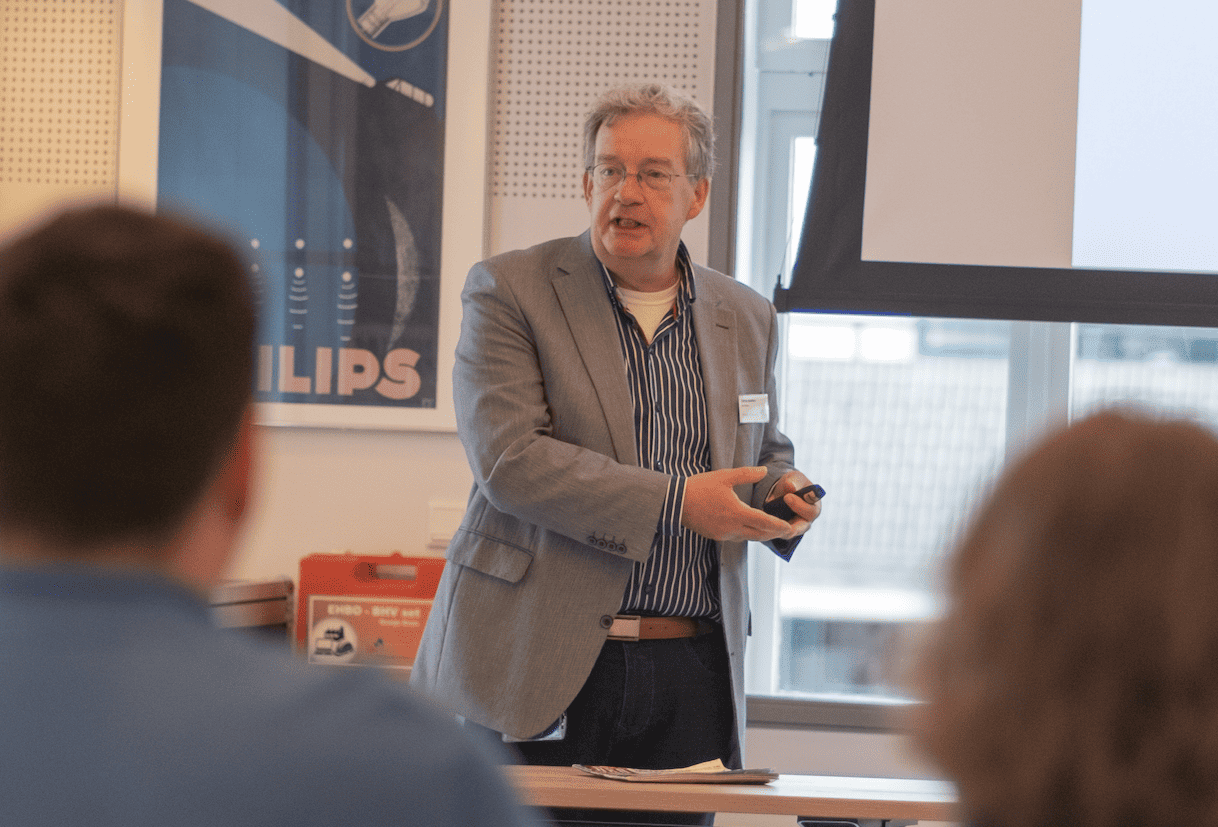
Spread throughout the La Place building on the campus of the Technical University of Eindhoven, Industrial Design students are presenting their bachelor and master products during Demo Day. From sleep monitoring to smart lighting. And everything in between. Divided into eleven themes from Smart Mobility to Ultra-Personalized Textile Services, there is too much to drop in on and see in one day.
Connecting Rich Interaction in Growing Systems is a mouthful. But, put simply, the students here are mainly concerned with the Internet of Things, systems that come into play and the design of them. Many projects are about light and how this can influence your mood. Those sorts of things. But also a social door. A what? Yes, you read it right.
Cas Verploegen, Loïs Lentz and Sanne Beijer discovered, during their research, that a door can be used in a social way. “A closed door often means that people do not want to be disturbed, while an open door gives a welcoming message.” This led the three to a door that can anticipate this, with a movable screen in front of the glass and an adjustable door knob. “It is the same as the open and closed door. But now with an open screen and a door knob to the left indicates: Come in. With the door knob all the way to the right, a person needs more effort to get in, so that is already closed. If the screen also covers the glass, you know that the person doesn’t want to be disturbed.” Verploegen: “We are researching how to make use of this further. In the future, it might be that the door ‘knows’ whether or not you want to be disturbed and reacts to this. This data can be collected in a variety of ways. A simple one, for example, is your music choice.”

Further on, David van Gelder de Neufville, approached things differently. “I didn’t want to design the next device connected to the internet, then I’d contribute only to data sharing. That’s happening enough already.” Van Gelder de Neufville devised The Oracle – a virtual assistant that knows everything about the user and his or her family. “It is a fictional scenario, but all the data used is actually available. You can ask The Oracle about your own agenda, but also about that of your wife and children. That data is easy to find from a digital agenda.” But other data that you are just giving away ‘for no reason’ can also be used: “The Oracle can predict at what time a family member will arrive home by looking at when they were logged into the WIFI-network from the previous days. But you can also connect different data points to answer questions. For example, if I want to know, as a father, if my daughter is already sleeping, Oracle looks at her last status on Facebook and links that to the Philips Hue lamp that was turned off. Every device that is connected to the internet provides pieces of information. Combining and merging data makes you very recognizable. People are not always aware of that.”
His project is not really meant to be accomplished, but is more to start a conversation or discussion: “The reactions I get range from really cool to creepy. It is consciously designed to do so. You can also ask Oracle when you will die. This is determined by life expectancy, but also how often you fly, your eating behavior (this data comes from your fridge), your sporting habits and how much you sleep at night (Fitbit). You can also ask if your wife is cheating. This could, in principle, be discovered through all appointments and social media messages. These are questions you do not want to know and they instigate a certain response. I am not at all against these kinds of developments, but I am against the development that large companies such as Facebook, Google or Apple have at their disposal.”
Van Gelder van Neufville can’t ignore that there are more and more systems being developed to respond ‘more genuinely’. Take films such as Her and Ex-Machina in which AI deceives mankind. “There is more and more interaction with machines becoming ever more advanced. So, who knows what the future holds? Until then, we need to keep an eye on what data we all share and think about how we can keep that data in our own hands.








